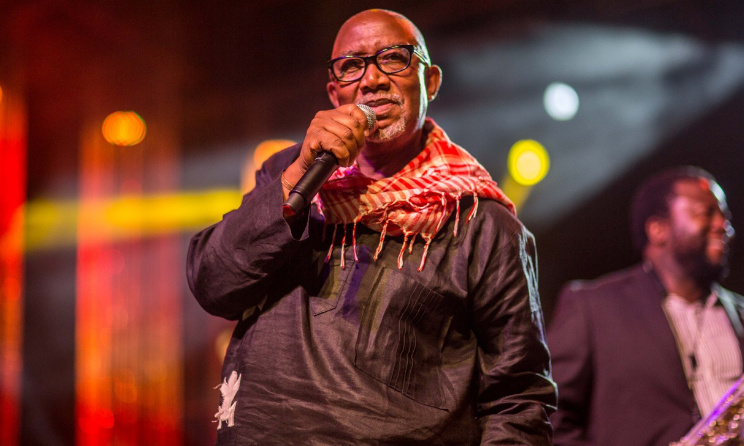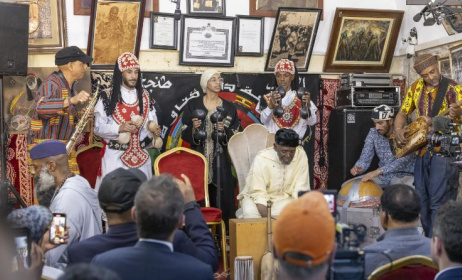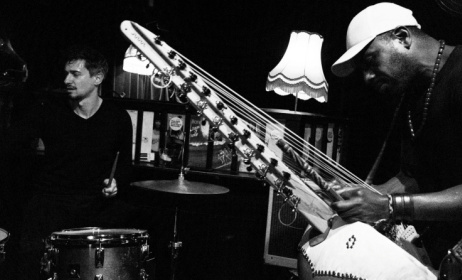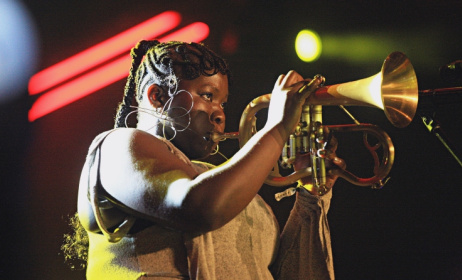Can jazz be ‘woke’ or is it ‘just compressed air through a metal tube’?
By Gwen Ansell
“Jazz is not just music,” the late singer Nina Simone is quoted as saying. “It’s a way of life, a way of being and a way of thinking.”
 Sipho 'Hotstix' Mabuse says musicians must to speak truth to power.
Sipho 'Hotstix' Mabuse says musicians must to speak truth to power.
So it is unsurprising that the genre has been 'woke' since before wokeness was coined – that was probably by Harlem author William Melvin Kelley in his 1962 essay If You’re Woke You Dig It.
But what is woke today? The Oxford English Dictionary explained the term like this in its quarterly update in June 2017: “Originally: well-informed, up-to-date. Now chiefly: alert to racial or social discrimination and injustice; frequently in stay woke.”
A group of veteran South African players foregrounded historic and current wokeness in the Liberation Project, revisiting and revisioning songs of protest, at this year’s Cape Town International Jazz Festival (CTIJF). It’s a foretaste of an international collaborative album (co-produced by English musician Phil Manzanera) that will launch in May 2018.
As one of the vocalist of the Liberation Project, Sipho 'Hotstix' Mabuse, explained: “Music has always been at the forefront and the arts still need to ask, ‘Who are we?’ and speak truth to power. Much of what we have done since [the end of apartheid in] 1994 has been done badly. The ballot is there, and yet we still allow children to die in poverty and people to amass fortunes at our expense.”
Musical form and process
Ideas of change formed a current that energised much of the two-day jazz event. The current was complex, and extended beyond content to musical form and process.
As American pianist Vijay Iyer noted: “How does music ‘say’ anything? I think there’s a distinction between music that is political (pinning things down with words; striking a stance) and music that does politics – that performs the idea of community and action.”
He told his festival masterclass about drawing on multiple rhythmic sources to interrogate identity in the early 2000s, because “for people who look like me, the period after September 11 was very intense. Basically I was seen as the enemy”.
Bassist Miles Mosley said: “We need music that can help people tackle the intricacies of social experience. I don’t feel (that) as a pressure. It’s not easy; it’s daunting, but it’s a responsibility.”
South African guitarist Keenan Ahrends concurred: “You have a prominent role, a stage to speak from, listeners. You have power and responsibility because of that. What you do could be positive or negative – the whole pop ‘money, b*tches and hoes’ thing. I prefer to express positivity and freedom.”
One artist, New Orleans bandleader Trombone Shorty, proposed a different purpose for his sound: “Politics? Not in my music. For me, music is about fun.”
But his implicit assertion that there are contrary pulls between enjoyment and ideas is not universally shared. Fellow New Orleans player, trumpeter Nicholas Payton argues: “You can create music on a high intellectual level that people can still shake their booties to. I want that dance sensibility in my music – there’s no contradiction between the two.”
The songs of the Liberation Project build their audience appeal on an inherent rhythmic groove – this, after all, was music that people marched and toyi-toyi-ed to during the struggle against apartheid.
And Iyer has researched extensively – and enacted in the trio album Accelerando – the identity between music and movement: “Not only dance or march, but the movement of breath, and the timescale in the body that is memory.”
On-stage collaboration
The politics of on-stage collaboration matter. Ahrends says: “If you look at the guitar in rock bands, for example, it’s always stepping up to the front and dominating. I try not to play that kind of patriarchal role. My question on stage has to be: ‘How can I contribute?”
For Iyer: “I like to get to the point in our groups where I’m not leading. My eyes are often closed… with the trio, we’re spread out on stage and don’t really look at one another.”
Explorations of form and sound are essentially political. They challenge the status quo in society by interrogating categories and barriers, but they challenge the status quo in the discourse of the genre too.
While Mosley hopes his music will “lift people forward in a positive movement”, he equally aims to, “liberate my instrument. For 500 years, the upright bass has moved the music forward, but its sound has been shackled by its acoustic properties. I’ve tried to unshackle that… to revolutionise the upright bass.”
Gender and jazz
While the jazz festival public debate preceding the concerts, on gender and jazz, interrogated the question of who was doing the playing as well as how, that was less discussed by musicians at the event.
The Liberation Project works with bassist Aus Tebza Sedumedi, in Ahrends’ South African band there’s regular bassist Romy Brauteseth, and the digital slices of Payton’s stage sound came courtesy of the dexterous DJ Lady Fingaz. The creativity of fellow South African, vocalist and trombonist Siya Makuzeni, powered the performance of the Louis Moholo-Moholo group. But all-male ensembles dominated the sit-down space of the festival’s Rosie’s stage, seen by some as the primary site of the event’s jazz.
For Iyer, that raises questions, even as he values the working relationships built up over years that shape his current sextet: It’s all-male. Gender can’t be ignored and it’s something I do think about. There should be women in collaborations and it’s problematic when there are not.
Songs at the strike
Back in February 2017 progressive English folk singer Billy Bragg told the Folk Alliance conference about the songs he heard around the 1984 UK miners’ strike: “The miners lost. The Clash didn’t change the world. They didn’t even give me the courage of my convictions. Being in that audience did. Seeing a hundred thousand kids just like me standing up against racism – that gave me the courage of my convictions to go back to work Monday morning and stand up for what I bloody well believed in.”
At the Cape Town festival Mabuse explained it like this: “It’s the consciousness of the music-makers that determines what the music does.”
Or as Payton put it: “There are always choices about how you express yourself. The trumpet without the mind of the person behind it is just… blowing compressed air through a metal tube.”
Gwen Ansell is an associate of the Gordon Institute for Business Science, University of Pretoria. This article first appeared on The Conversation.
































Comments
Log in or register to post comments